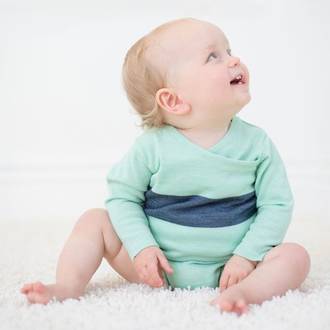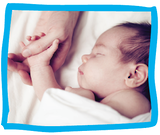5 Tips on how to look after your baby’s skin
|
Babies have delicate skin which can sometimes become irritated by things like textiles, talcum powders, soaps and other common baby care products. Often, the culprits are harsh chemicals, which can not only harm your baby's sensitive skin, but can also damage the planet. Here are 5 ways to help look after your baby's skin using eco-friendly baby products, which are better for your baby and for the environment.
|
You might also be interested in ...
6 Ways to support parents with premature babies
If someone you know has recently had a premature baby there are lots of things you can do to help out and to make the parents' lives just that little bit easier during the first few weeks. From celebrating the birth, to buying gifts and cards, making meals and offering more practical help so that they can focus on their baby.
7 Things to know about newborn babies
Every newborn baby is unique, but they already have the most amazing brain ready to soak in new experiences and the ability to learn. Here are a few basic things you need to know about your newborn baby's senses and development.







Often, the culprits are harsh chemicals, which can not only harm your baby's sensitive skin, but can also damage the planet.
Here are 5 ways to help look after your baby's skin using eco-friendly baby products, which are better for your baby and for the environment.
5 Tips on how to look after your baby's skin
1. Neonatal acne
The skin is the largest of all our organs, and while during pregnancy, most organs develop early on, a baby's skin requires the full nine months to reach maturity.
Nearly one in five newborns experience small pink bumps on the face and chest during their first month.
Neonatal acne is usually due to hormonal changes in the mother, and it will normally clear up without requiring treatment within a few weeks.
If the condition persists or gets worse consult with your paediatrician, and never be tempted to squeeze spots as this could lead to permanent scarring.
2. Bathing your baby
Immersing a baby in a tub of water is not recommended until their umbilical stump has fallen off.
Until this time a simple sponge bath is perfectly adequate, and if the tummy button area looks a little raw, swab it with alcohol and keep it completely dry.
Once it is completely healed you can start bathing your baby with natural baby care products being used to help reduce chances of irritation.
Use small amounts of specially formulated baby soaps and shampoos, which are ideally mild and scent-free.
Once your child starts eating solid foods and to crawl about they're going to be getting dirtier and so can be bathed on a daily basis.
Cradle cap scales can be loosened with a little olive oil or mineral oil before washing their hair, and for unruly hair choose a natural baby shampoo and conditioner.
3. Washing you baby's clothes
Some skin conditions can be genetic, so it's likely that if mummy has sensitive skin, baby will too.
Wash new clothes and towels before using and employ a gentle detergent without dyes, fragrances and allergens.
Eco-friendly baby products are better for your baby and for the planet.
Choose natural rather than synthetic fabrics for your baby clothes and try garments made of Merino wool.
This wool is super soft and silky and it will not irritate delicate skin, even in babies with eczema.
4. Sunscreen for your baby's skin
Sunscreen should never be applied to babies under 6 months of age, and if possible they should be kept out of the sun during peak hours.
If you do decide to use a sunscreen on your child look for a broad spectrum product that blocks both UVA and UVB rays with an SPF factor of at least 30.
Products containing zinc oxide or titanium dioxide are less likely to cause allergic reactions, but the best option is to have fun in the shade and keep out of the sun.
5. Nappy rash
Nappy rash is almost inevitable, especially as the materials used to prevent leaking in disposable nappies also reduce air circulation to create a perfect environment for a rash to develop.
At every change wash the entire area with water or one of the natural baby care products designed for this task.
Dry the area thoroughly before applying a reasonable amount of moisture-blocking zinc oxide based cream.
Consider using the new style of cloth nappies.
Your baby, and the environment, will thank you for it, and do let your baby enjoy as much nappy-free time as possible.
Other baby articles for you to enjoy
Source: This article was written by Merino Kids™ – a New Zealand based company that specialises in producing 100% natural baby and toddler sleepwear and clothing.